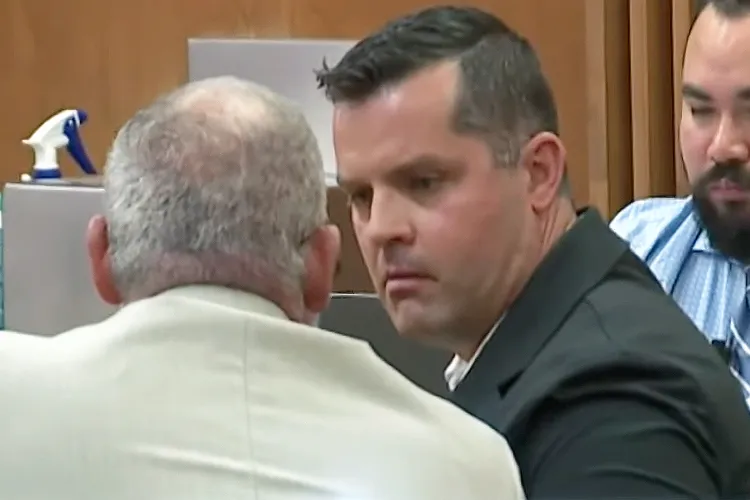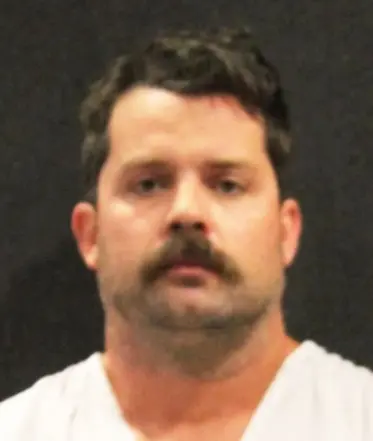Tragic Twist: Arizona Father Who Pleaded Guilty in His 2-Year-Old Daughter’s Hot-Car Death Found Deceased Before His Sentencing
In a harrowing and unexpected turn of events, 38-year-old Christopher Scholtes was found dead on the morning of November 5, according to records from the Maricopa County Coroner’s Office — a development that comes just days before he was to be formally sentenced in the tragic death of his 2-year-old daughter. The cause of his death is listed as under investigation and an autopsy has been ordered, with results not expected until early 2026.

The underlying case has shocked and haunted the Tucson area ever since July 9, 2024, when Scholtes’ daughter, named in court records as Parker, died after being left in a vehicle parked in direct sunlight. According to documents obtained by law enforcement during the investigation, the temperature that day reached 109 °F (about 42.7 °C), and the car in which Parker was left had an automatic shut-off feature for the engine — a fact Scholtes acknowledged knowing.
Scholtes initially told authorities he had parked the vehicle with the air conditioning running and left Parker asleep in her car seat for “no more than 30 minutes or so” while he stepped inside the home. But subsequent video surveillance and police interviews revealed the timeline was much longer. According to court filings, he had been inside the home for more than three hours while the vehicle sat idle in the driveway — during which time the air-conditioner shut off and the interior of the vehicle became a furnace.
Investigators also noted that Parker’s older sisters — then aged 6 and 9 — told detectives their father had left them alone inside a vehicle on past occasions. The complaint alleges the father “got distracted by playing his game and putting his food away” while his children sat inside the car, a detail that prompted additional charges.
In March 2025, Scholtes rejected a plea deal that would have resulted in a 10- to 25-year prison sentence on a second-degree murder charge, choosing instead to press forward in negotiations. Ultimately, on October 22, he accepted a plea agreement: he pleaded guilty to second-degree murder and intentional/knowing child abuse under circumstances likely to cause death or serious physical injury, in the case of his daughter’s death. Under the terms of the plea, he faced between 20 and 30 years in prison, with the sentences to run consecutively and with what was described as “flat time” — meaning he would not be eligible for early release.
His sentencing was scheduled for November 21, and he was to begin serving his detention on November 3. The abrupt timing of his death raises immediate questions and leaves many unanswered.
The scandal surrounding Parker’s death has reverberated throughout the community, not only for the heartbreaking loss of a young child, but for the series of alleged warnings and neglect that came to light. Text messages included in court records show Parker’s mother, Erika Scholtes, an anesthesiologist, had previously told her husband: “I told you to stop leaving them in the car, how many times have I told you?” to which he responded: “Babe, I’m sorry … How could I do this? I killed our baby, this can’t be real.”

Those messages, added to repeated reports of children in the vehicle unsupervised, formed the backdrop to the tragic day. The court also heard testimony that a West-facing window placement in the driveway placed direct sunlight on the vehicle’s interior and its air-conditioning shut off feature was known to the driver.
It was a routine day that turned into a nightmare. Prosecutors said Scholtes had returned home with Parker after running errands. He parked the vehicle, left the car running with the A/C on while Parker remained inside, and then went inside the home. Hours passed and when returning outside, he found the car off, the A/C gone, and Parker unresponsive. Emergency services rushed her to a local hospital, where she was pronounced dead.
In the wake of the tragedy, the case became emblematic of the deadly potential of hot cars, especially in extreme heat, but also served as a stark example of alleged repeated neglect. Court records show the Arizona Department of Child Safety investigated Scholtes nine times between June 2014 and December 2020 for incidents involving neglect, emotional and physical abuse of children in his care — though none of those investigations resulted in formal findings.
The fact pattern raised strong criticism from child-welfare advocates, prosecutors and the public: a child’s life cut short; an alleged pattern left unaddressed; and in the hours after her death, the father’s justifications — that he had only stepped inside for a moment or left her because she was sleeping — were cast aside by surveillance footage and detailed investigative findings. The lapse, prosecutors argued, was not merely tragic but preventable.
Now with Scholtes’ death, the legal chapter has shifted dramatically. Instead of standing before a judge to hear a sentence of decades in prison, the defendant will not. The coroner’s office has yet to release the cause of death, and it remains under investigation. The scheduled autopsy, and its findings, will determine whether the death was self-inflicted or accidental. The unknowns now multiply: how he died; whether the family will face additional civil or criminal proceedings; what impact this will have on the surviving children.
For the family of Parker, this outcome provides no closure. Her memory remains at the centre of grief and questions. Her mother and two older sisters were left grappling with what occurred that day, what should have occurred to prevent it, and how to begin healing in the aftermath of both a devastating loss and a disrupted legal process. The surviving siblings now must navigate life without their youngest sister and amidst the fallout of a shattered family system.
From a broader view, the case of Christopher Scholtes stands as a warning and a cautionary tale: the danger of unattended children in vehicles, the consequences of distractions, and the societal responsibility to protect the most vulnerable. The temperature on the day in question, the shut-off feature of the vehicle, the hours unattended — all converge into a tragic equation. The legal system’s handling of the case, with travel permitted, motions rejected and plea bargaining changing, also raises questions about accountability, pre-trial discretion and the protection of children within the legal process.
As authorities await the post-mortem findings, public attention will likely turn to the surviving children, the mother and the home environment leading up to the tragedy. Whether further investigations emerge into the wife’s awareness or whether civil suits are filed for emotional damages remains on the horizon. For now, the headline is one of death: not only the death of a toddler in a hot car but now the death of the man who would have been held accountable.
In the coming weeks, the coroner’s findings will shed more light on how Christopher Scholtes died — but one thing is already clear: a family has been irreparably broken, a little girl’s life lost, and a sobering reminder planted in public consciousness about the real risks of leaving children unattended in vehicles. As the legal process shifts to what happens next, the focus for the community remains firmly on the memory of Parker and the urgent need to safeguard children from tragedies that might otherwise be prevented.


